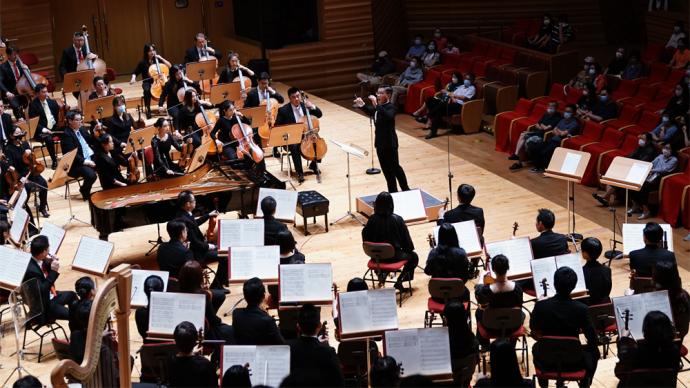
The much-anticipated symphonic poem "A Thousand Miles of Rivers and Mountains", backed by the famous scroll "A Thousand Miles of Rivers and Mountains", was first tried in Shanghai.
On the evening of July 30, this magnificent work, jointly commissioned by 23 symphony orchestras across the country and meticulously polished by composer Zhao Lin for a year, was conducted by the post-90s conductor Sun Yifan and conducted the Shanghai Symphony Orchestra. It premiered at the Shanghai Summer Music Festival. It imitated a music picture full of Chinese humanistic and philosophical thoughts for the audience on the spot and in the cloud.
"This is a musical work with the spirit of Chinese aesthetics." Mao Shi'an, a literary critic who came to the scene, believed that the composer was quite individual. The music reproduces a young painter's true feelings about nature, depicts the splendid mountains and rivers of the beautiful China, and interprets the essence of China's excellent traditional culture.
"Like a poem and picturesque", "ancient rhythm", "like a clear spring entering the water"... Viewers from all over the world swiped the barrages one after another. tears.
The premiere of "A Thousand Miles of Rivers and Mountains" in Shanghai marked the end of the 2022 Shanghai Summer Music Festival and opened the prelude to the national tour. Next, "A Thousand Miles of Rivers and Mountains" will be performed 20 times across the country by the China Philharmonic Orchestra, Guangzhou Symphony Orchestra, Hangzhou Philharmonic Orchestra and other orchestras in succession, in order to sing praises to the motherland's thousands of miles of rivers and mountains, praise Chinese culture, and welcome the 20th National Congress of the Communist Party of China.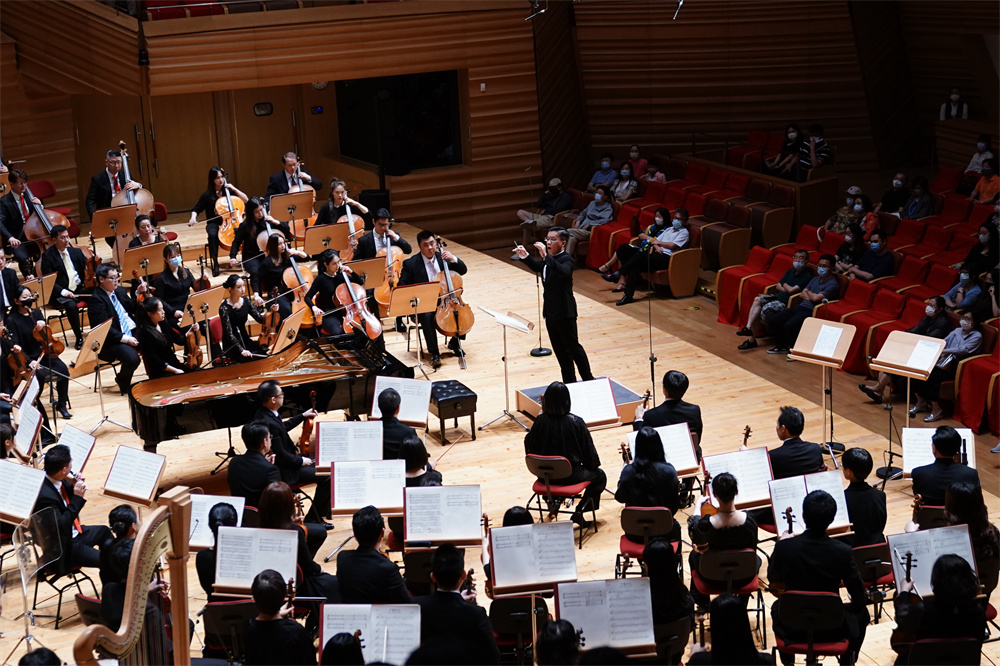
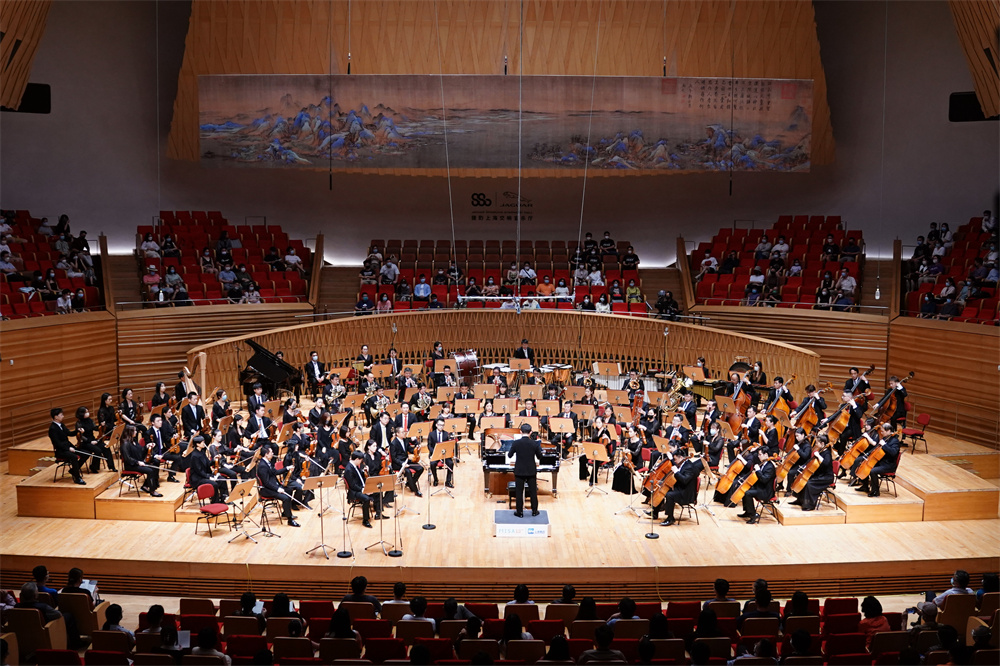
"A Thousand Miles of Rivers and Mountains" painted by Wang Ximeng of the Northern Song Dynasty is regarded as the pinnacle of green landscape painting in the Song Dynasty. Every mountain, valley, mound and water in the painting has a different appearance, scattered in an orderly manner, the momentum is coherent, and it is very rhythmic and beautiful, giving the musicians unlimited imagination.
In 2021, under the advocacy of Yu Long, chairman of the Symphony Orchestra Alliance of the China Music Association, 23 symphony orchestras across the country jointly proposed a commission to composer Zhao Lin to revitalize this ancient scroll into a musical poem.
"Clouds fly, Chutian thousands of miles", "Water and clouds melt", "Moon and pine wind", "Thousand stacks of mighty", "Rong Shukong", "Wanshan into the sea", six pieces of music with different styles correspond to "A Thousand Miles of Rivers and Mountains" The six parts of "Picture" attempt to answer such a philosophical question from different sides: what is China, what is the Chinese.
The composer adopted a bixing technique similar to that of the Book of Songs in each movement, writing objects first, and then using objects and people. The titles and subtitles of each movement are derived from ancient famous lines in Tang poetry and Song poetry. Most of these lines reflect the inner feelings of ancient Chinese literati and writers when facing the mountains and rivers.
In addition to interpreting the majestic rivers and mountains of the motherland with majestic orchestral music, the composer also stacks different movements with solo instruments such as sheng (Weng Zhenfa), pipa (Li Shengnan), erhu (Lu Yiwen), piano (Sun Yifan), bamboo flute (Wang Junkan) and other solo instruments. , as well as the national soprano solo (Fang Qiong), which played a "finishing" effect. In the Shanghai premiere version, Xiao was also added, which was also played by Wang Junkan.
Zhao Lin and his father, Zhao Jiping, are both famous composers. Both father and son were born in a family of calligraphy and painting. Zhao Lin's grandfather, Zhao Wangyun, was one of the founders of the Chang'an School of Painting. Influenced by his family heritage, Zhao Lin has been interested in painting since he was a child, especially traditional Chinese painting.
Although "A Thousand Miles of Rivers and Mountains" is closely related to "A Thousand Miles of Rivers and Mountains", it does not simply use music to interpret the picture, but uses music to describe the landscape in the composer's heart, and through the description of the landscape in his heart, to describe his views on society, Feelings about nature and humanity.
"This is a kind of creation that I express my feelings through landscapes. It is not about painting scenery, but more about the inner activities of people in nature and society, as well as the influence of the outside world on people." Zhao Lin said.
"A Thousand Miles of Rivers and Mountains" is also a second collaboration with Zhao Lin after the double concerto "Du" for cello and sheng. Over the years, Shanghai Jiao and composers have been trying to put Chinese philosophy into flowing notes, trying to explore what Chinese people and Chinese souls are through music.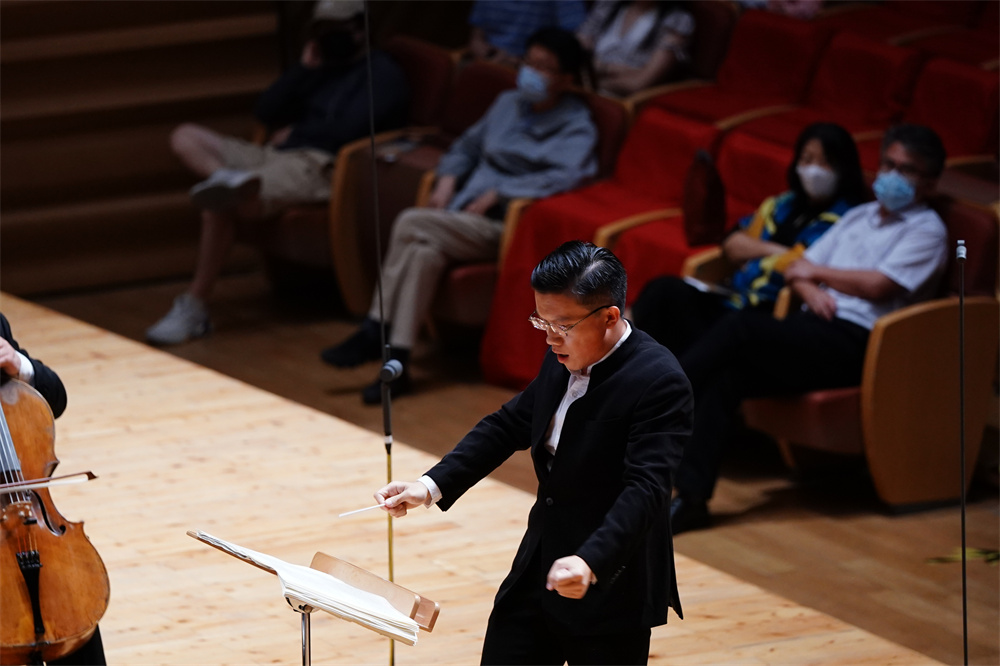
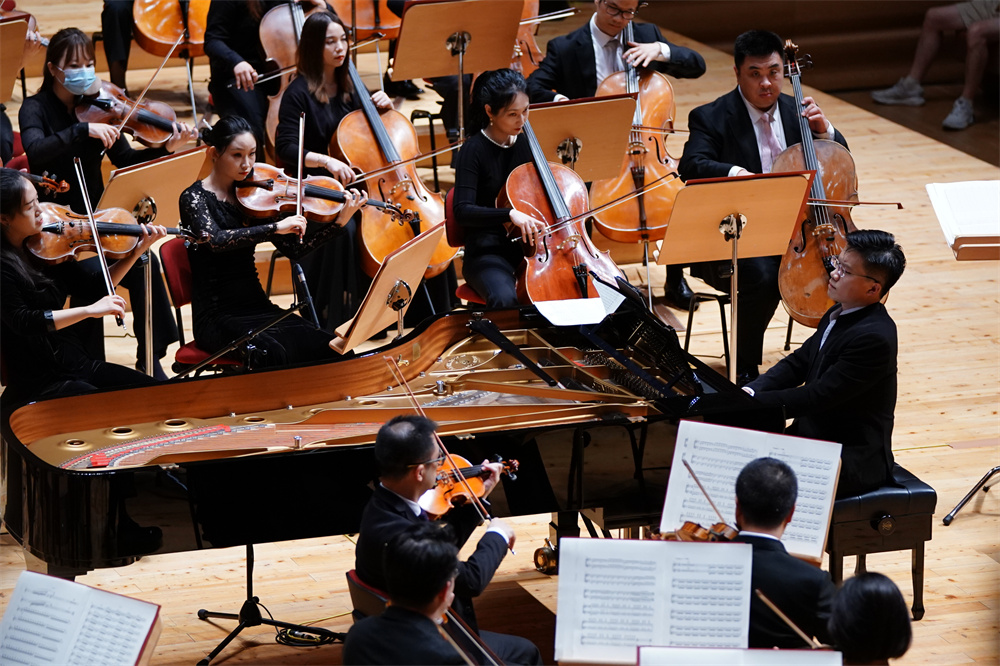
This new work was originally scheduled to be directed by Yu Long for the premiere, but it was not possible due to the epidemic. Sun Yifan had just finished his studies in Germany and was transferring back to China at Warsaw Chopin Airport. Sun Yifan received the news of "rescue". At this time, it was only 15 days before the premiere.
Being ordered in a critical situation and under heavy responsibilities, Sun Yifan is under pressure, and more is the excitement brought by the challenge.
Before that, he knew very little about "A Thousand Miles of Rivers and Mountains". Yu Long specially sent a photocopy of the original painting, which included the interpretation of the painting, to guide him to get started. During the immersive viewing of the painting, Sun Yifan gradually entered the painting and became the person in the painting.
"There are cargo boats, fishing boats, and passenger boats on the river. There are different pedestrians on the road. Some people drink, some take children, and some do laundry... The painting has a sense of macroscopic structure without losing microscopic precision, and the same is true for music. There is a rendering of the overall atmosphere, and stippling can also be heard, such as the birdsong from the flute."
Sun Yifan has only one week to get the score. He has a habit of reading scores, from thick to thin, then from thin to thick. After delving into the details, he will not be addicted, but will definitely withdraw and see the panorama from a distance.
In directing the premiere of such an hour-long masterpiece, Sun Yifan's challenge is that he does not have any reference materials, so he often relies on his own understanding and re-creation of the score.
Before the show, he had an unexpected two-hour call with the composer. For example, in the second half of the second movement, he imagined two children playing happily in the water, full of innocence and childishness, but in the composer's imagination, two old men were sitting and drinking, and the artistic conception was more detached and indifferent. If the music is handled too aggressively and mischievously, it is not what the composer wants.
In the fifth movement, Sun Yifan, who studied piano, also took on the important task of solo piano. While quarantined in the hotel, he practiced with a simple keyboard and picked up the piano again. From the beginning to the end, there is no room for the conductor in his hands. He has to use his eyes, head, and shoulders to signal the band conductor, and he is very busy.
Sun Yifan was a big fan of summer music festivals as early as when he was a middle school student. Today, he has changed from a bystander to a participant, and on his first stage, he has to shoulder the burden of directing the world premiere of a blockbuster work.
"I'm very lucky and grateful." In Sun Yifan's view, this is a kind of trust in many aspects, including the summer music festival's trust in young people, the audience's trust, and the audience's trust in the summer music festival. Without either side of the trust, the summer festival would not be as dynamic and glamorous as it is now."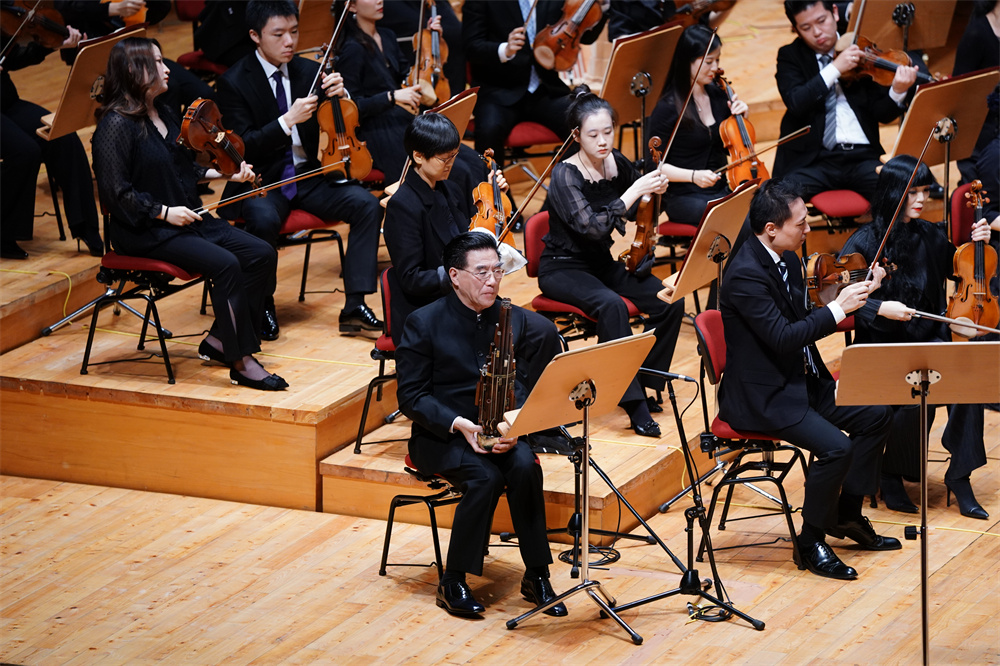
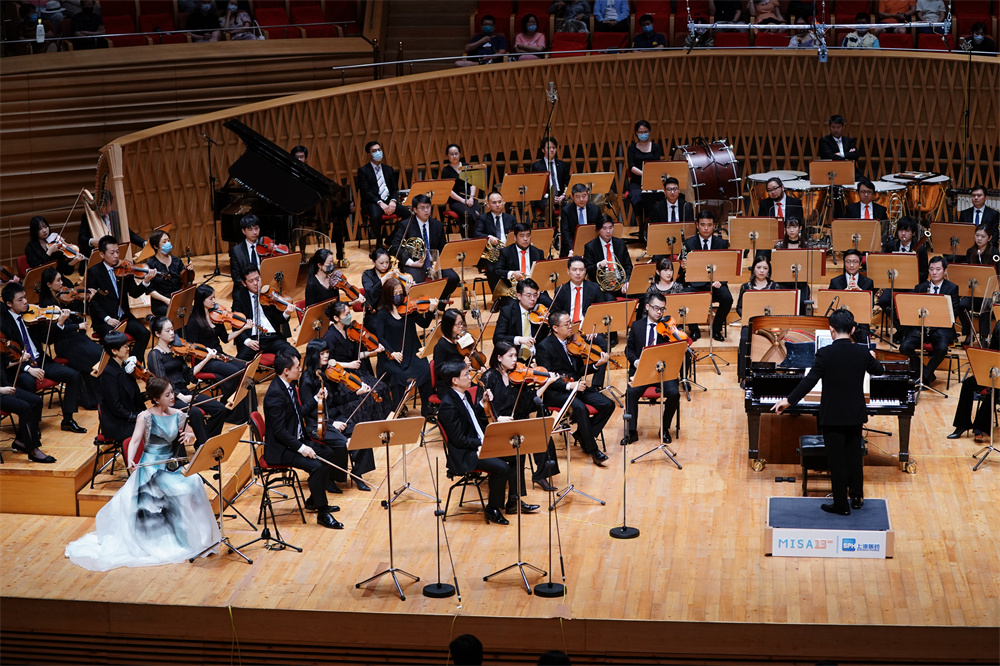
On the evening of July 30, this magnificent work, jointly commissioned by 23 symphony orchestras across the country and meticulously polished by composer Zhao Lin for a year, was conducted by the post-90s conductor Sun Yifan and conducted the Shanghai Symphony Orchestra. It premiered at the Shanghai Summer Music Festival. It imitated a music picture full of Chinese humanistic and philosophical thoughts for the audience on the spot and in the cloud.
"This is a musical work with the spirit of Chinese aesthetics." Mao Shi'an, a literary critic who came to the scene, believed that the composer was quite individual. The music reproduces a young painter's true feelings about nature, depicts the splendid mountains and rivers of the beautiful China, and interprets the essence of China's excellent traditional culture.
"Like a poem and picturesque", "ancient rhythm", "like a clear spring entering the water"... Viewers from all over the world swiped the barrages one after another. tears.
The premiere of "A Thousand Miles of Rivers and Mountains" in Shanghai marked the end of the 2022 Shanghai Summer Music Festival and opened the prelude to the national tour. Next, "A Thousand Miles of Rivers and Mountains" will be performed 20 times across the country by the China Philharmonic Orchestra, Guangzhou Symphony Orchestra, Hangzhou Philharmonic Orchestra and other orchestras in succession, in order to sing praises to the motherland's thousands of miles of rivers and mountains, praise Chinese culture, and welcome the 20th National Congress of the Communist Party of China.

Post-90s Conductor Rising Stars Lead the Shanghai Symphony Orchestra

The Shanghai Symphony Orchestra is backed by "A Thousand Miles of Rivers and Mountains"
Draw a thousand miles of rivers and mountains with music as a pen"A Thousand Miles of Rivers and Mountains" painted by Wang Ximeng of the Northern Song Dynasty is regarded as the pinnacle of green landscape painting in the Song Dynasty. Every mountain, valley, mound and water in the painting has a different appearance, scattered in an orderly manner, the momentum is coherent, and it is very rhythmic and beautiful, giving the musicians unlimited imagination.
In 2021, under the advocacy of Yu Long, chairman of the Symphony Orchestra Alliance of the China Music Association, 23 symphony orchestras across the country jointly proposed a commission to composer Zhao Lin to revitalize this ancient scroll into a musical poem.
"Clouds fly, Chutian thousands of miles", "Water and clouds melt", "Moon and pine wind", "Thousand stacks of mighty", "Rong Shukong", "Wanshan into the sea", six pieces of music with different styles correspond to "A Thousand Miles of Rivers and Mountains" The six parts of "Picture" attempt to answer such a philosophical question from different sides: what is China, what is the Chinese.
The composer adopted a bixing technique similar to that of the Book of Songs in each movement, writing objects first, and then using objects and people. The titles and subtitles of each movement are derived from ancient famous lines in Tang poetry and Song poetry. Most of these lines reflect the inner feelings of ancient Chinese literati and writers when facing the mountains and rivers.
In addition to interpreting the majestic rivers and mountains of the motherland with majestic orchestral music, the composer also stacks different movements with solo instruments such as sheng (Weng Zhenfa), pipa (Li Shengnan), erhu (Lu Yiwen), piano (Sun Yifan), bamboo flute (Wang Junkan) and other solo instruments. , as well as the national soprano solo (Fang Qiong), which played a "finishing" effect. In the Shanghai premiere version, Xiao was also added, which was also played by Wang Junkan.
Zhao Lin and his father, Zhao Jiping, are both famous composers. Both father and son were born in a family of calligraphy and painting. Zhao Lin's grandfather, Zhao Wangyun, was one of the founders of the Chang'an School of Painting. Influenced by his family heritage, Zhao Lin has been interested in painting since he was a child, especially traditional Chinese painting.
Although "A Thousand Miles of Rivers and Mountains" is closely related to "A Thousand Miles of Rivers and Mountains", it does not simply use music to interpret the picture, but uses music to describe the landscape in the composer's heart, and through the description of the landscape in his heart, to describe his views on society, Feelings about nature and humanity.
"This is a kind of creation that I express my feelings through landscapes. It is not about painting scenery, but more about the inner activities of people in nature and society, as well as the influence of the outside world on people." Zhao Lin said.
"A Thousand Miles of Rivers and Mountains" is also a second collaboration with Zhao Lin after the double concerto "Du" for cello and sheng. Over the years, Shanghai Jiao and composers have been trying to put Chinese philosophy into flowing notes, trying to explore what Chinese people and Chinese souls are through music.

Directed by Sun Yifan

Sun Yifan piano solo
The post-90s directing the new star to save the field world premiereThis new work was originally scheduled to be directed by Yu Long for the premiere, but it was not possible due to the epidemic. Sun Yifan had just finished his studies in Germany and was transferring back to China at Warsaw Chopin Airport. Sun Yifan received the news of "rescue". At this time, it was only 15 days before the premiere.
Being ordered in a critical situation and under heavy responsibilities, Sun Yifan is under pressure, and more is the excitement brought by the challenge.
Before that, he knew very little about "A Thousand Miles of Rivers and Mountains". Yu Long specially sent a photocopy of the original painting, which included the interpretation of the painting, to guide him to get started. During the immersive viewing of the painting, Sun Yifan gradually entered the painting and became the person in the painting.
"There are cargo boats, fishing boats, and passenger boats on the river. There are different pedestrians on the road. Some people drink, some take children, and some do laundry... The painting has a sense of macroscopic structure without losing microscopic precision, and the same is true for music. There is a rendering of the overall atmosphere, and stippling can also be heard, such as the birdsong from the flute."
Sun Yifan has only one week to get the score. He has a habit of reading scores, from thick to thin, then from thin to thick. After delving into the details, he will not be addicted, but will definitely withdraw and see the panorama from a distance.
In directing the premiere of such an hour-long masterpiece, Sun Yifan's challenge is that he does not have any reference materials, so he often relies on his own understanding and re-creation of the score.
Before the show, he had an unexpected two-hour call with the composer. For example, in the second half of the second movement, he imagined two children playing happily in the water, full of innocence and childishness, but in the composer's imagination, two old men were sitting and drinking, and the artistic conception was more detached and indifferent. If the music is handled too aggressively and mischievously, it is not what the composer wants.
In the fifth movement, Sun Yifan, who studied piano, also took on the important task of solo piano. While quarantined in the hotel, he practiced with a simple keyboard and picked up the piano again. From the beginning to the end, there is no room for the conductor in his hands. He has to use his eyes, head, and shoulders to signal the band conductor, and he is very busy.
Sun Yifan was a big fan of summer music festivals as early as when he was a middle school student. Today, he has changed from a bystander to a participant, and on his first stage, he has to shoulder the burden of directing the world premiere of a blockbuster work.
"I'm very lucky and grateful." In Sun Yifan's view, this is a kind of trust in many aspects, including the summer music festival's trust in young people, the audience's trust, and the audience's trust in the summer music festival. Without either side of the trust, the summer festival would not be as dynamic and glamorous as it is now."

Weng Zhenfa

Lu Yiwen
Related Posts